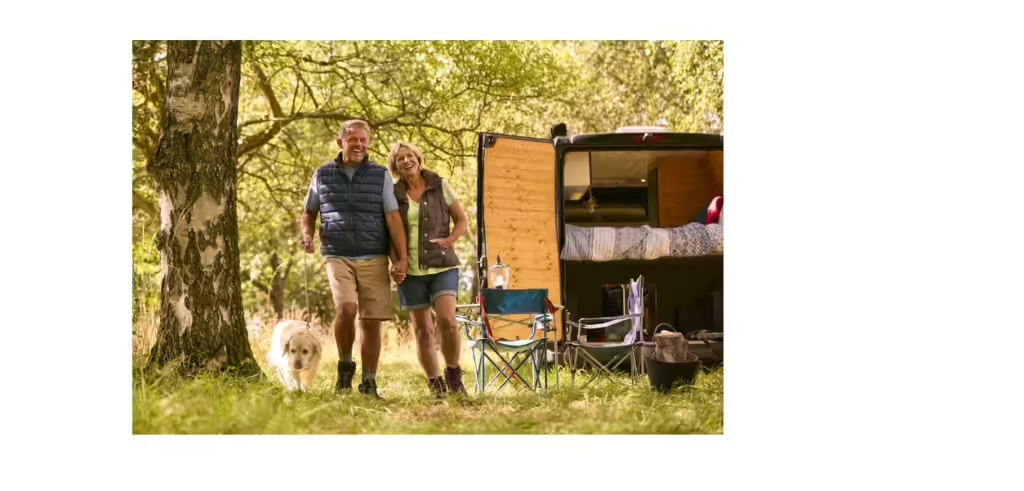
How non-millionaires ..
Can enjoy the road trip of a lifetime
I was listening to the radio the other day and a woman phoned the ‘Australia all over’ program to speak with Macca. She told host, Ian McNamara, how she and her husband were on a boat, moored off the coast at Great Keppel Island. This was their retirement. She apparently popped back to her home base occasionally for visits to the grandkids and to attend a funeral or two. She made this life of low or no responsibilities sound very appealing.
So today we look at whether this is achievable for most ‘ordinary’ Australians who don’t have a handy million or two tucked away.
You may recall that in late July adviser Nicole Bell ran the numbers for Jan and Jim who had exactly the median couples amount in super savings and not much else. Nicole’s forecasts showed how their joint super of $415,219 would mean maximum Age Pension eligibility and if they topped up by about $20,000 per annum, they could achieve something close to their desired retirement income, totalling $65,000 per annum.
Can Jan and Jim hit the road?
Does their ‘non millionaire’ retirement status now mean they can only have modest travel dreams?
Not necessarily. Here’s how a year-long break might work for this couple with savings typical of many retirees.
First, a quick recap of their assets
According to Australian Tax Office (ATO) data, the 2023 median amounts were as follows:
- Singles (aged 65-69)
- Male $213,986, Female $201,233
- Couple (aged 65-69, based upon total of above amounts) $415,219
In our previous article Nicole used the Retirement Essentials Retirement Forecaster tool to check how well the median amounts would fund a full retirement journey for a couple and a single.
The following assumptions were made:
- All savings are in super (i.e. no other financial assets)
- House contents are valued at $10,000
- Car value is $30,000
She ran the scenario for Jan and Jim and found that if they are spending $65,000 per annum earlier in retirement, then reducing down to $58,000 per annum from age 85 onwards, there is an 85% probability there is still some wealth remaining to continue to maintain their standard of living at age 92. The $65,000 per year is achieved by a combination of (current) Age Pension of 43,752, with a $21,248 per annum top up?
Adventure is calling
Jan and Jim own a home in regional Australia, valued at $850,000. In order to explore Australia for 12 months, they have agreed to let this home rent-free to their son and his wife. But the younger couple must cover household outgoings (insurance, maintenance, rates etc), energy bills and maintain the garden.
They have purchased a used 6-berth KEA River Motorhome for $121,000. It has 200,000 kilometres on the clock. They considered towing a caravan but felt their old car wasn’t up to it and that the motorhome would pay for itself if they used it for free camping whenever possible, rather than paying for sites in a caravan park.
Here’s how their Age Pension and asset situation has changed
| Non-financial assets | Before buying motorhome | After purchase of motorhome |
| House contents | $10,000 | $ 10,000 |
| Car | $30,000 | $ 30,000 |
| Motorhome | $121,000 | |
| Financial assets | ||
| Super | $415,219 | $294,219 |
| Deemed income on financial assets | $7266 | $4544 |
| Entitlement | ||
| Full Age Pension | $43,752 per annum combined | $43,752 per annum combined |
You’ll note that the amount of pension income has not changed, which is because Jan and Jim were already on a maximum entitlement, so lower deemed income does not affect their fortnightly payments.
Do they still need a top-up?
The next question is whether they try to continue with the plan to top up their Age Pension with super payments of $21,248 per annum, given their super is now much lower. As always, there are trade-offs when one life stage gives way to another. They will definitely be saving on many of the major costs homeowners face by offering their home rent-free. But will these savings be enough to cover high fuel costs, the fees charged if they do seek a powered or unpowered caravan park site? And what about the occasional desire to stay in a cabin? Insurance and ongoing repairs and maintenance for the motorhome will mean additional expenses. It’s also likely they will eat out more and this could prove expensive.
Money earning options
Jan and Jim are happy to share their home with their son to help him save and buy his own home. But if they chose to rent their home, they might be better off. That’s a decision best left to them, but at least worth thinking about. They are also very active, so doing some occasional work in regional towns may allow them to replace the super drawdown. In the first year they can both earn, after the income free area of $9,360, another $11,800 each. After this they can earn $7,800 per annum. Odd jobs and project work don’t simply mean fruit picking – many smaller towns are crying out for skilled workers, particularly locum teachers, nurses aged care workers and tradespeople. Jan and Jim also realise that a high ratio of free camping will definitely keep the bills down but need to see how realistic this is once they get underway. A friend suggested they sign up for less than $10 a year to WikiCamps so they can find free spots easily.
Does Centrelink keep paying your Age Pension when you travel?
Centrelink does keep paying you, but there’s a catch. Remember that exempt asset worth $850,000 belonging to Jan and Jim? At the end of 12 months Centrelink will consider that Jan and Jim’s primary residence is the $121,000 (or depreciated value thereof) motorhome. And that their $850,000 home is a financial asset. This could obviously have a dramatic effect on their Age Pension entitlement, so they are planning to return at least a month before this becomes an issue.
Future income planning
As they believe they will live on slightly less than planned, Jan and Jim are not overly concerned about their super lasting the distance. While a 12-month road trip sounds gloriously long to most of us, within a retirement journey of 80+ years, it’s a short time. Barring accidents or freak acts of nature, they plan to sell their motorhome on their return and recoup some of the money which they can use to replenish their retirement funding. They also believe that a little work from time to time is a great thing for both of them.
Sometimes we know part of a rule, but not the whole. This might have been financially damaging if, in the case of Jan and Jim, they hadn’t been told of the Centrelink revaluation of assets after 12-months. That’s why it’s always useful to touch base with a qualified professional before making major money decisions.
In the case of planning extended travel, understanding how this might affect your Centrelink situation is really important, even more so if you wish to travel overseas for more than six weeks. An Age Pension consultation can help you stay on top of all of these rules.
You may also wish to get a better ideas of the implications for your superannuation or to run a couple of retirement income forecasts so that you are comfortable you are able to afford your planned adventures.
Whatever you decide to do … enjoy this beautiful country while you can!
Do you also have BIG travel plans?
If so, how will you organise the financial side?






If you are travelling and you return home before the 12 months away (say 11 months and three weeks) how you long do you have to stay home before you can travel again? If only one partner is working how much is the allowance for a couple?
Hi Paul, Centrelink do not have a set time that you must remain home before travelling again as they assess these situations on a case by case basis. Our recommendation would be that you live in the primary residence for at least 4 weeks before travelling again but there are a number of variable factors that Centrelink consider when deciding if you are truly living in the home or have moved out and it should be treated as an investment property.
Regarding your second query “If only one partner is working how much is the allowance for a couple?” I presume you are referring to the Work Bonus? If so then as per the article the work bonus amount does not vary between singles and couples, $11,800 is the max. As any unused balance accrues, in the scenario where only one member of a couple is working and the other is not it simply means that the person working will likely have a lower Work Bonus balance (because they are actively using it) whereas that other person’s will simply accrue and wait for a time when they may take on work.
It may be of interest to look at caravaning costs. We’ve been caravaning for many years now and I have kept records of fuel and accomodation costs. We have an off road caravan and tow with a landcruiser 200 series and on average we use 20 litres diesel/100 km which is quite thirsty!
In 2014 we were away for nearly a year and over this time average daily fuel cost was $31.50 (Average diesel cost $1.56/litre) and average daily accomodation cost of $21.70. (all up $372/week) for fuel and accomodation). We did 34700 km and stayed in a mix a of free camps and caravan parks.
By comparison in 2022 for a 3 month trip average daily fuel cost were $83.67 (average diesel cost $2.27/litre). Accomodation costs were an average of $30.30 per day. (all up $798/week for fuel and accomodation). We did 12100 kms on this trip which was much quicker than we would normally do which does increase the daily fuel costs in combination with the cost of diesel which was considerably more. More economical cars and smaller vans would reduce costs.
These costs didn’t include food or extras such as local tours or admission fees for the many tourist activities you may want to participate.
Caravaning or motorhoming is not for everyone but if you want to experience this wonderful country it’s a fantastic lifestyle and results in many new friendships and experiences. Hopefully this might help the budgeting process.
Hi if you rented out your house whilst you were away from it (assuming under 12 months) would the house still be exempt from the assets test? I assume in most cases the rental income would cause the pension to be assessed under the income test anyway?
thanks Glenn
Hi Glenn, the house does remain exempt from asset testing whilst away and yes the rental income is assessable so it may mean income testing as opposed to asset testing.
Hi Glenn,
My partner is still 45 y.o. and I just turned 65 y.o. I will retire this year. My partner will also resign from work as we planned to go oveeseas (Philippines) to stay there for 6 months and then come back here in Australia. We will rent out our house here in Australia while we are overseas. Here are my questions:
a. Will I receive the max pension?
b. Will our house still be exempt from the asset test?
Hi Gordon, there are many factors that go in to determining the amount of pension you receive so the information you have provided alone is not enough to even guess at how much pension you would be eligible for (if any). If the 6 month trip is a one off then your house in Australia will be considered your primary residence and remain exempt from asset testing however if you are regularly splitting your time 50/50 between here and the Philippines then Centrelink may question the situation and consider you living in the Philippines instead.
hello my wife works casual and is thai and age 51.
l am 66 and due for a pension in October
we live in seniors section of caravan park for over 55s and paid $135k for our cabin plus have lease and & maitainance fees.
are we considered non home owners?
Hi Craig, based on what you have said Centrelink would consider you to be non-homeowners because they base their decision in these circumstances on the amount you paid to ‘buy-in’ to the park and your amount was quite low.
is it possible for us to spend 5 months per year in Thailand and retain aged pension and Medicare etc.?
we have land lease in Australia and buying a condo in thailand
Centrelink assess these situations on a case by case basis so there is no set rule/time limit but given you would be spending more then half of the year living in Austrlia Centrelink would likely consider you as an Australian resident with the trips away classed as holidays. The condo in Thailand would be considered an investment property and be an assessable asset as only your primary place of residence is exempt, any other property is assessable.
Once on the pension next year we plan to sell our home for about 1.2 million and travel Australia by caravan for 12 months. After that we plan to downsize somewhere. I believe the 1.2 million from the home sale is not included in the assets test for12 months but is the interest earned (term deposit) on that money deemed reportable income, therefore impacting the pension amount?
Cheers, Wayne.
Hi Wayne you are correct that the proceeds from the sale are exempt from asset testing whilst you buy/build a new home but it’s actually exempt for 24 months now not 12. The deemed income on that money is assessable though as you thought and so can impact your pension.
Why are these issues so complicated? We have lives without a pension for over 10 years. Before that we had a small payment but that was lost due to the assessment of our super fund and a home which has just been assessed as $1.8million, despite being over 70 years old. Due to the high cost of living our funds are rapidly disappearing as we live on about $50,000 from our super fund. I also received a small UK pension received every 3 months of about $1,000 wher I worked for 7 years before emigration. I left full time work in 1994. From this period I earned a very small amount from my son’s business but had to leave it to someone else as it had bcome much larger. I get nothing except a concession card.